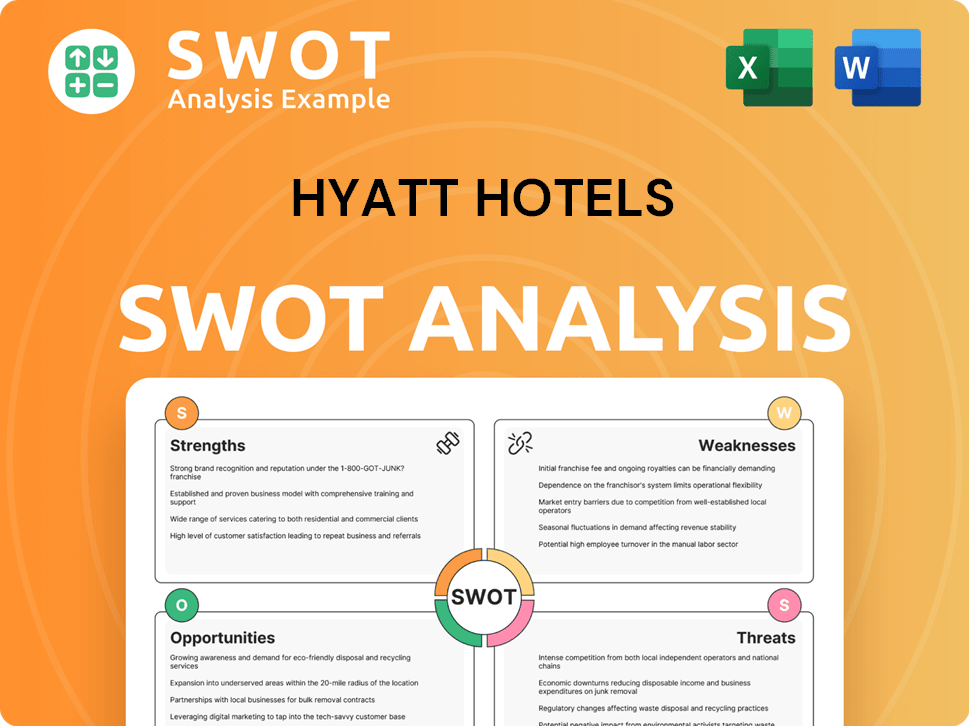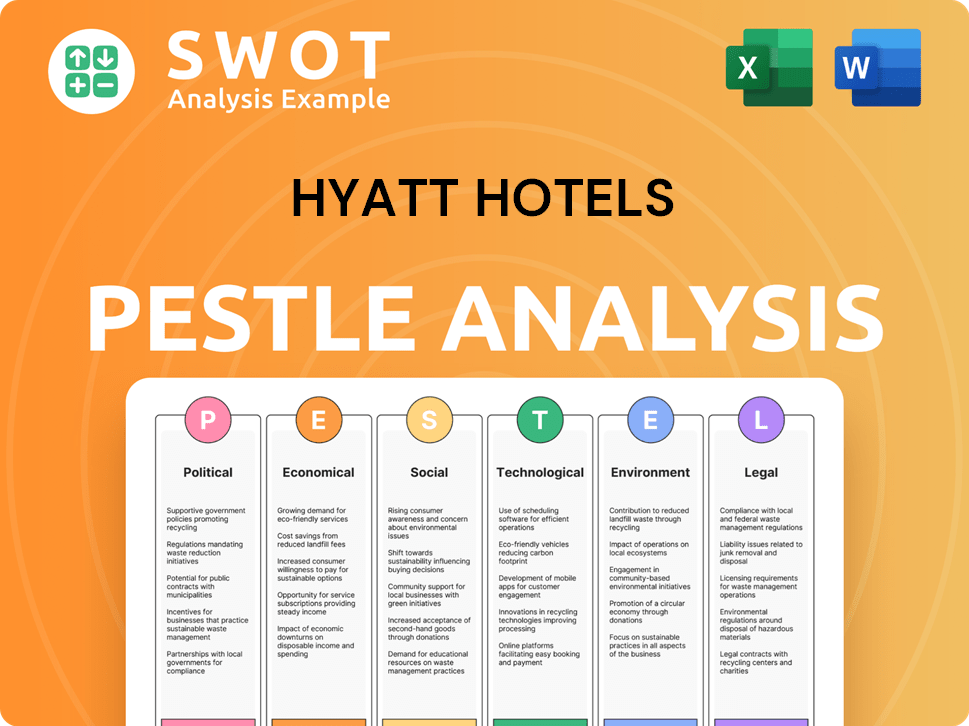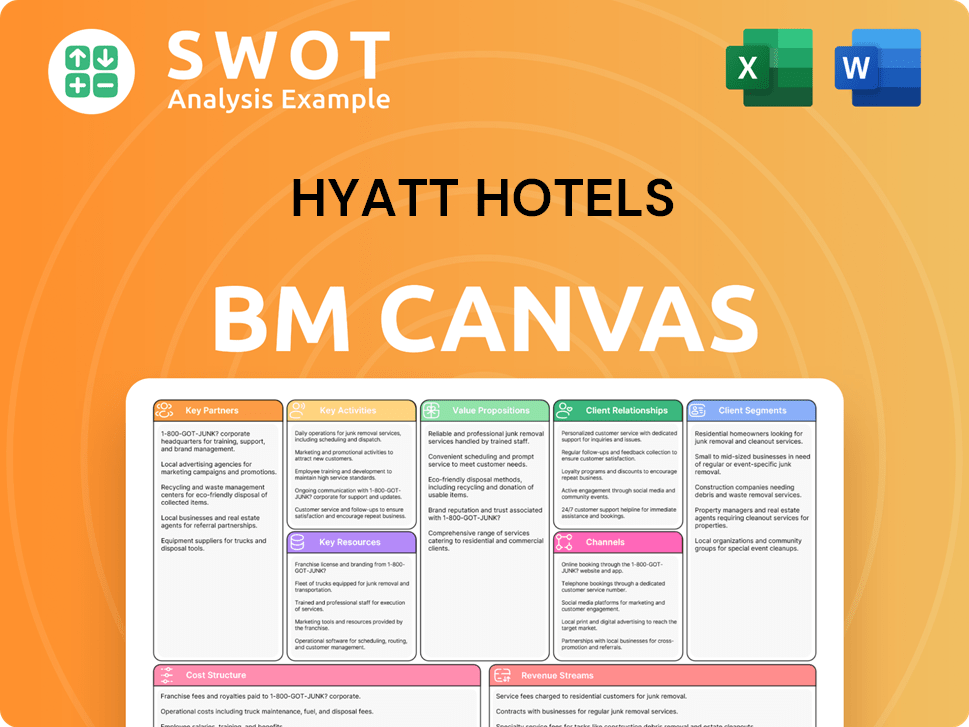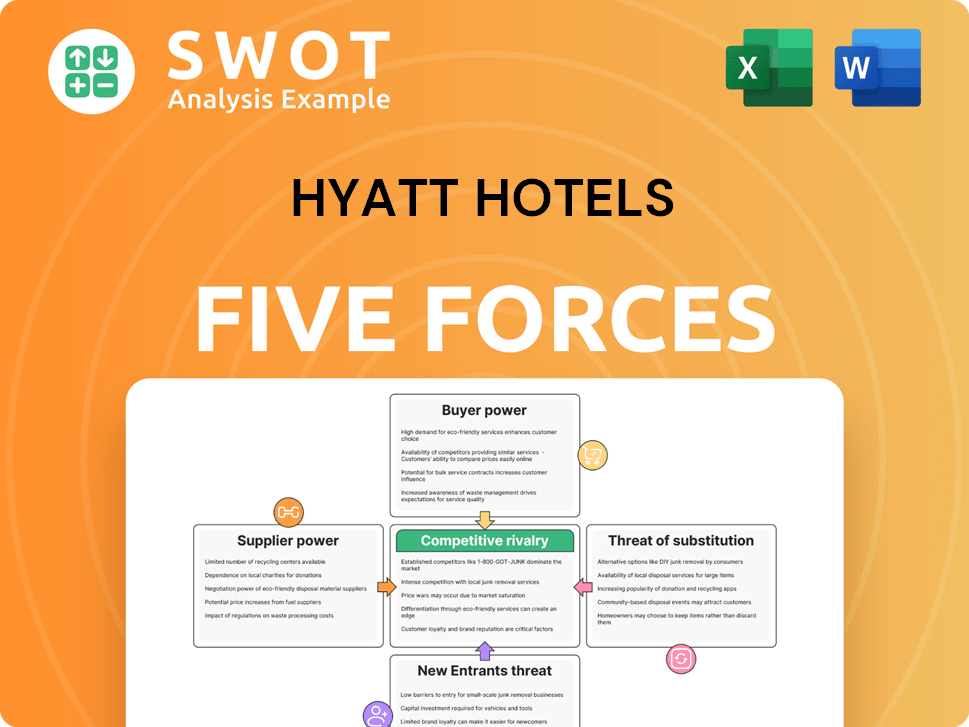Hyatt Hotels Bundle
How Did Hyatt Hotels Become a Global Hospitality Powerhouse?
From a single motel near an airport to a global empire, the Hyatt Hotels SWOT Analysis reveals a fascinating journey. This article explores the brief history of Hyatt Hotels company, tracing its evolution from its humble beginnings. Discover the key milestones and strategic decisions that propelled Hyatt to the forefront of the luxury and upscale hotel market.

The Hyatt company story begins with Hyatt founder Jay Pritzker's vision in 1957, which set the stage for decades of growth. Understanding the Hyatt timeline and Hyatt history is crucial for grasping its current market position. Examining early Hyatt Hotels locations and Hyatt Hotels acquisitions over time provides valuable insights into its expansion strategy and the evolution of its diverse portfolio of Hyatt brands, as well as the Hyatt Hotels and its founders.
What is the Hyatt Hotels Founding Story?
The story of Hyatt Hotels Corporation begins on September 27, 1957. This is when Jay Pritzker made a pivotal move, acquiring the Hyatt House motel near Los Angeles International Airport for $2.2 million. This purchase marked the official start of what would become a global hospitality giant. This strategic acquisition was a key moment in Hyatt's history.
The original Hyatt House motel was initially established in 1954 by Hyatt Robert von Dehn and Jack Dyer Crouch. Jay Pritzker, alongside his brother Donald Pritzker, saw a significant opportunity. They aimed to provide high-quality accommodations near major airports, anticipating the growing importance of air travel.
The initial business model focused on convenient and comfortable lodging for air travelers. The first product was the Hyatt House motel itself. It was a concept designed to serve the needs of airport-bound guests. The Pritzker family's business interests provided the initial funding. This strategic identification of a market need—quality airport hotels—became the cornerstone of Hyatt's early development.
Hyatt Hotels Corporation was founded in 1957 by Jay Pritzker.
- The first Hyatt House motel was purchased for $2.2 million.
- The original motel was located near Los Angeles International Airport.
- The initial focus was on providing lodging for air travelers.
- The Pritzker family provided the initial funding.
Hyatt Hotels SWOT Analysis
- Complete SWOT Breakdown
- Fully Customizable
- Editable in Excel & Word
- Professional Formatting
- Investor-Ready Format

What Drove the Early Growth of Hyatt Hotels?
Following its establishment, the Hyatt Hotels company quickly entered a phase of rapid growth and expansion. This expansion was marked by significant architectural innovations and strategic international ventures. The company's early strategy focused on establishing a strong presence in key locations and diversifying its offerings to cater to a broader market.
Within two years of acquiring the original Hyatt House, additional hotels were opened near major airports. In 1962, the Hyatt Corporation went public, operating with two divisions. The company's expansion strategy focused on strategic locations to increase its market presence.
A pivotal moment arrived in 1967 with the opening of the Regency Hyatt House in Atlanta. This hotel introduced the iconic atrium-style design, a signature element for many Hyatt properties. This innovation set the company apart in the global hospitality sector.
Recognizing opportunities beyond North America, Hyatt International Corporation was formed in 1968. The first international location, the Hyatt Regency Hong Kong, opened in 1969. This marked the beginning of the company's global presence.
In 1972, a central reservations office was established in Omaha, Nebraska, with a toll-free 800 number. The 1980s saw the introduction of new brands, including Grand Hyatt and Park Hyatt. To learn more about the Hyatt Hotels business model, read this article: Revenue Streams & Business Model of Hyatt Hotels.
Hyatt Hotels PESTLE Analysis
- Covers All 6 PESTLE Categories
- No Research Needed – Save Hours of Work
- Built by Experts, Trusted by Consultants
- Instant Download, Ready to Use
- 100% Editable, Fully Customizable

What are the key Milestones in Hyatt Hotels history?
The Hyatt Hotels Corporation has a rich Hyatt history, marked by significant milestones that have shaped its growth and global presence. From its early days to its current status as a leading hospitality company, Hyatt Hotels has consistently expanded its portfolio and enhanced its offerings, demonstrating a commitment to excellence and innovation. The Hyatt company has achieved numerous significant events over the years.
| Year | Milestone |
|---|---|
| 1957 | The first Hyatt Hotels property opened in Los Angeles, marking the beginning of the company's journey. |
| 1967 | Hyatt Hotels introduced the atrium-style hotel design with the Hyatt Regency Atlanta, setting a new architectural standard. |
| 1987 | Hyatt Hotels launched the Hyatt Gold Passport program, later rebranded as World of Hyatt in 2017, to enhance guest loyalty. |
| 2004 | Hyatt Hotels acquired AmeriSuites, which was later rebranded as Hyatt Place. |
| 2005 | Hyatt Hotels acquired Summerfield Suites, which was later rebranded as Hyatt House. |
| 2018 | Hyatt Hotels acquired Two Roads Hospitality, expanding its portfolio. |
| 2021 | Hyatt Hotels acquired Apple Leisure Group, broadening its all-inclusive offerings. |
| 2023 | Hyatt Hotels acquired Dream Hotel Group, further diversifying its brand presence. |
| 2024 | Hyatt Hotels acquired Standard International, adding luxury and lifestyle brands. |
Hyatt Hotels has consistently introduced innovative concepts to enhance the guest experience and redefine hotel design. The atrium-style hotel design, pioneered by Hyatt, revolutionized hotel architecture and became a signature element. The World of Hyatt loyalty program, with 54 million members by the end of 2024, a 22% year-over-year increase, demonstrates Hyatt's commitment to customer engagement and retention.
Hyatt's innovative atrium-style hotel design, starting with the Hyatt Regency Atlanta, transformed hotel architecture.
The World of Hyatt loyalty program, with its growing membership, has been a key driver of customer loyalty and engagement.
Hyatt Hotels has strategically acquired brands like AmeriSuites, Summerfield Suites, Two Roads Hospitality, Apple Leisure Group, Dream Hotel Group, and Standard International to expand its portfolio.
The hospitality industry's competitive landscape and economic downturns present ongoing challenges for Hyatt Hotels. The company's total debt reached $4.3 billion as of May 1, 2025, though liquidity remains robust at $3.3 billion. Hyatt faced challenges, including the insolvency filing of a franchisee associated with the Lindner Group in Germany, affecting over 2,000 rooms.
The hospitality industry is highly competitive, with new players and existing competitors constantly innovating.
Market downturns and economic fluctuations pose financial challenges for Hyatt, requiring strategic adaptation.
Hyatt has dealt with challenges, such as the insolvency filing of a franchisee associated with the Lindner Group in Germany, impacting its operations.
Hyatt Hotels Business Model Canvas
- Complete 9-Block Business Model Canvas
- Effortlessly Communicate Your Business Strategy
- Investor-Ready BMC Format
- 100% Editable and Customizable
- Clear and Structured Layout

What is the Timeline of Key Events for Hyatt Hotels?
The Hyatt Hotels company's journey began in 1957 when Jay Pritzker purchased a motel near Los Angeles International Airport, marking the genesis of what would become a global hospitality leader. The Hyatt history is filled with strategic moves and innovations that have shaped the industry.
| Year | Key Event |
|---|---|
| 1957 | Hyatt founder Jay Pritzker acquired the Hyatt House motel, setting the stage for the company's establishment. |
| 1962 | Hyatt Corporation went public, signaling its early growth and expansion ambitions. |
| 1967 | The Hyatt Regency Atlanta opened, introducing the innovative atrium design that became a hallmark. |
| 1969 | Hyatt expanded internationally with the opening of Hyatt Regency Hong Kong. |
| 1980 | The Grand Hyatt and Park Hyatt brands were launched, diversifying the company's offerings. |
| 1987 | Hyatt Gold Passport, the loyalty program, was introduced to reward frequent guests. |
| 2004 | Hyatt acquired AmeriSuites, later rebranded as Hyatt Place, expanding its portfolio. |
| 2005 | Summerfield Suites was acquired, later becoming Hyatt House, further broadening its offerings. |
| 2007 | The Andaz brand made its debut, targeting a contemporary, lifestyle-focused market. |
| 2017 | World of Hyatt replaced Hyatt Gold Passport, enhancing the loyalty program. |
| 2018 | Acquisition of Two Roads Hospitality expanded its portfolio further. |
| 2021 | The acquisition of Apple Leisure Group significantly increased its resort offerings. |
| 2023 | Hyatt acquired Dream Hotel Group, adding to its luxury and lifestyle brands. |
| 2024 | Acquisition of Standard International added to the company's expanding portfolio. |
| January 2025 | The Venetian Resort Las Vegas joined the Hyatt system, significantly increasing its room count. |
| Q1 2025 | Hyatt opened its first Hyatt Studios extended stay hotel in Mobile, Alabama. |
Hyatt plans to open seven new hotels in India and Southwest Asia in 2025, following 21 new hotel deals signed in 2024. The company aims to have 100 hotels in India within the next five years. This expansion is a key part of Hyatt's growth strategy.
For 2025, Hyatt projects a comparable system-wide hotels RevPAR growth between 1% and 3% compared to 2024. Net rooms growth is expected to be between 6% and 7%. The net income is projected to be between $95 million and $150 million.
Hyatt is focused on enhancing guest experiences through technology and loyalty program improvements. The company is also committed to its asset-light business model. This approach is designed to meet evolving traveler preferences.
Hyatt plans to add over 50 luxury and lifestyle hotels globally by 2026. Group room revenue is projected to be 7% higher than 2024, indicating strong demand. The company's growth trajectory is focused on high-growth markets.
Hyatt Hotels Porter's Five Forces Analysis
- Covers All 5 Competitive Forces in Detail
- Structured for Consultants, Students, and Founders
- 100% Editable in Microsoft Word & Excel
- Instant Digital Download – Use Immediately
- Compatible with Mac & PC – Fully Unlocked

Related Blogs
- What is Competitive Landscape of Hyatt Hotels Company?
- What is Growth Strategy and Future Prospects of Hyatt Hotels Company?
- How Does Hyatt Hotels Company Work?
- What is Sales and Marketing Strategy of Hyatt Hotels Company?
- What is Brief History of Hyatt Hotels Company?
- Who Owns Hyatt Hotels Company?
- What is Customer Demographics and Target Market of Hyatt Hotels Company?
Disclaimer
All information, articles, and product details provided on this website are for general informational and educational purposes only. We do not claim any ownership over, nor do we intend to infringe upon, any trademarks, copyrights, logos, brand names, or other intellectual property mentioned or depicted on this site. Such intellectual property remains the property of its respective owners, and any references here are made solely for identification or informational purposes, without implying any affiliation, endorsement, or partnership.
We make no representations or warranties, express or implied, regarding the accuracy, completeness, or suitability of any content or products presented. Nothing on this website should be construed as legal, tax, investment, financial, medical, or other professional advice. In addition, no part of this site—including articles or product references—constitutes a solicitation, recommendation, endorsement, advertisement, or offer to buy or sell any securities, franchises, or other financial instruments, particularly in jurisdictions where such activity would be unlawful.
All content is of a general nature and may not address the specific circumstances of any individual or entity. It is not a substitute for professional advice or services. Any actions you take based on the information provided here are strictly at your own risk. You accept full responsibility for any decisions or outcomes arising from your use of this website and agree to release us from any liability in connection with your use of, or reliance upon, the content or products found herein.